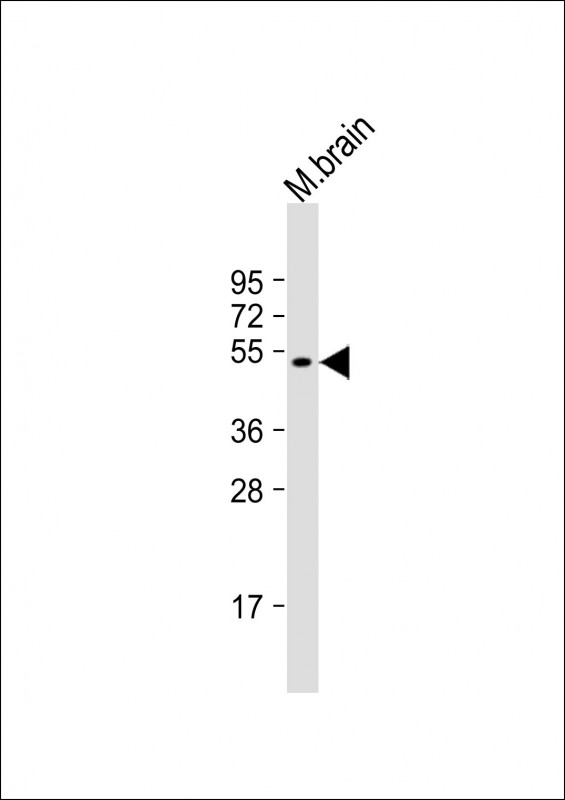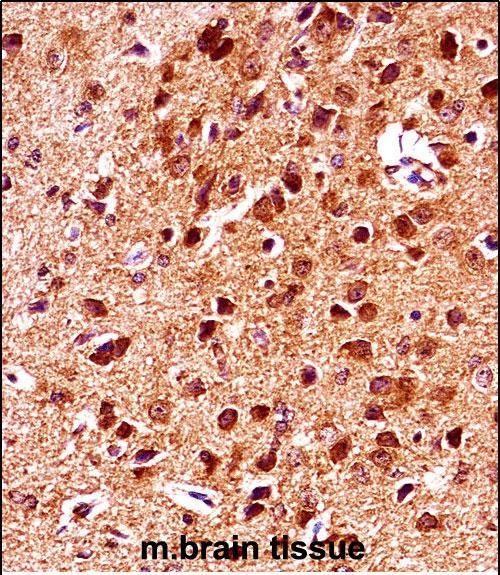


| WB | 1/1000 | Human,Mouse,Rat |
| IF | 咨询技术 | Human,Mouse,Rat |
| IHC | 1/100-1/500 | Human,Mouse,Rat |
| ICC | 技术咨询 | Human,Mouse,Rat |
| FCM | 咨询技术 | Human,Mouse,Rat |
| Elisa | 咨询技术 | Human,Mouse,Rat |
| Aliases | Glycogen synthase kinase-3 beta, GSK-3 beta, Serine/threonine-protein kinase GSK3B, Gsk3b |
| Entrez GeneID | 56637 |
| WB Predicted band size | 46.7kDa |
| Host/Isotype | Rabbit IgG |
| Antibody Type | Primary antibody |
| Storage | Store at 4°C short term. Aliquot and store at -20°C long term. Avoid freeze/thaw cycles. |
| Species Reactivity | Mouse |
| Immunogen | This Mouse Gsk3b antibody is generated from rabbits immunized with a KLH conjugated synthetic peptide between 30-59 amino acids from the N-terminal region of mouse Gsk3b. |
| Formulation | Purified antibody in PBS with 0.05% sodium azide. |
+ +
以下是3篇涉及小鼠GSK3β(N端)抗体的参考文献及其摘要概括:
---
1. **文献名称**:*"Glycogen synthase kinase-3β regulates cyclin D1 proteolysis and subcellular localization"*
**作者**:Diehl JA et al.
**摘要**:本研究利用抗小鼠GSK3β(N-term)抗体验证GSK3β在细胞周期调控中的作用,发现其通过磷酸化cyclin D1的N端结构域,促进其核转运和蛋白酶体降解,揭示Wnt/β-catenin通路与细胞增殖的关联。
2. **文献名称**:*"GSK3β inhibition modulates mitochondrial dysfunction in a mouse model of Alzheimer's disease"*
**作者**:Hernandez F et al.
**摘要**:通过N端特异性抗体检测GSK3β的活化状态,研究证明抑制GSK3β活性可改善阿尔茨海默病模型小鼠线粒体功能异常,并减少tau蛋白过度磷酸化,提示其作为治疗靶点的潜力。
3. **文献名称**:*"Tissue-specific roles of GSK3β in glucose homeostasis and hepatic insulin signaling"*
**作者**:Pearce NJ et al.
**摘要**:利用N端抗体进行免疫印迹及免疫组化分析,发现肝脏特异性敲除GSK3β的小鼠表现出胰岛素敏感性增强和糖代谢改善,表明GSK3β在肝胰岛素信号中的关键调控作用。
---
**注**:若需具体文献链接或更多细节,建议通过PubMed或Google Scholar以关键词“GSK3β N-term antibody mouse”检索,或查阅抗体供应商(如CST #9315)的引用文献列表。
The Mouse Gsk3b (N-term) antibody is designed to target the N-terminal region of glycogen synthase kinase 3 beta (GSK3β), a multifunctional serine/threonine kinase involved in diverse cellular processes, including metabolism, cell differentiation, proliferation, and apoptosis. GSK3β is a key regulator of signaling pathways such as Wnt, insulin, and growth factor signaling, often acting through phosphorylation-dependent modulation of downstream substrates like β-catenin, tau, and glycogen synthase. Dysregulation of GSK3β has been linked to diseases such as diabetes, neurodegenerative disorders, and cancer.
This antibody specifically recognizes the N-terminal epitope of mouse GSK3β, enabling the detection of endogenous protein levels in mouse-derived samples. It is commonly used in applications like Western blotting, immunohistochemistry, and immunofluorescence to study GSK3β expression, localization, and post-translational modifications. The N-terminal region of GSK3β is critical for its structural stability and interaction with regulatory proteins, making this antibody a valuable tool for investigating functional mechanisms. Cross-reactivity with orthologs in other species (e.g., rat, human) may occur due to high sequence homology in this region, but validation in specific experimental systems is recommended. Host species and clonality (e.g., rabbit monoclonal or polyclonal) vary by manufacturer, and users should verify compatibility with their assay requirements.
×